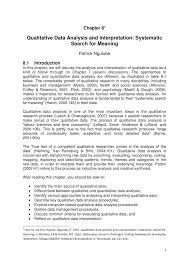Exploring Data Analysis in Qualitative Research: Uncovering Insights through Systematic Interpretation

Data Analysis in Qualitative Research
Qualitative research involves the collection and analysis of non-numerical data, such as text, images, videos, or observations. Data analysis in qualitative research is a systematic process of interpreting this type of data to uncover meaningful patterns, themes, and insights.
Key Steps in Data Analysis
The process of data analysis in qualitative research typically involves the following key steps:
- Data Preparation: This step involves organizing and preparing the raw data for analysis. Data may need to be transcribed, coded, or categorized to make it more manageable.
- Data Coding: Coding is the process of assigning labels or tags to segments of data based on their content or meaning. This helps in identifying patterns and themes within the data.
- Theme Development: Themes are overarching ideas or concepts that emerge from the coded data. Researchers identify recurring patterns and relationships to develop meaningful themes.
- Data Interpretation: In this step, researchers interpret the identified themes and patterns to draw conclusions and generate insights from the data. Interpretation often involves comparing findings with existing literature or theories.
Challenges in Qualitative Data Analysis
While qualitative research offers rich insights into complex phenomena, it also presents challenges in data analysis:
- Subjectivity: Researchers’ interpretations may be influenced by their own biases or perspectives.
- Data Overload: Qualitative data can be vast and diverse, making it challenging to manage and analyse effectively.
- Ambiguity: Qualitative data may lack clear-cut definitions or boundaries, leading to ambiguity in interpretation.
Conclusion
Data analysis is a crucial aspect of qualitative research that helps researchers make sense of complex non-numerical data. By following systematic methods such as coding and theme development, researchers can uncover valuable insights and contribute to a deeper understanding of social phenomena.
Essential Tips for Effective Data Analysis in Qualitative Research
- Thoroughly familiarise yourself with the data before starting the analysis.
- Use a systematic approach to code and categorise the data for easier interpretation.
- Maintain detailed documentation of your analytical process to ensure transparency and reproducibility.
- Regularly revisit your research questions to stay focused during the analysis.
- Consider using software tools designed for qualitative data analysis to streamline the process.
- Seek feedback from peers or experts in qualitative research to gain new insights and perspectives.
Thoroughly familiarise yourself with the data before starting the analysis.
In qualitative research, it is essential to thoroughly familiarise yourself with the data before commencing the analysis process. By immersing yourself in the data through careful reading, reviewing, and understanding of the information collected, you can gain a comprehensive insight into the nuances and complexities of the dataset. This initial step not only helps in identifying key patterns and themes but also allows for a deeper appreciation of the context in which the data was gathered. Familiarising oneself with the data sets a strong foundation for meaningful analysis and interpretation, ensuring that insights derived are grounded in a thorough understanding of the information at hand.
Use a systematic approach to code and categorise the data for easier interpretation.
When conducting data analysis in qualitative research, it is advisable to employ a systematic approach to code and categorise the data. By systematically assigning labels or codes to different segments of the data based on their content or themes, researchers can organise and structure the information in a way that facilitates easier interpretation. This method helps in identifying patterns, trends, and relationships within the data, ultimately leading to more coherent and insightful findings. A systematic approach to coding and categorising data enhances the rigor and reliability of qualitative research analysis, enabling researchers to extract meaningful insights and draw well-supported conclusions from their data.
Maintain detailed documentation of your analytical process to ensure transparency and reproducibility.
In qualitative research, it is essential to maintain detailed documentation of your analytical process to uphold transparency and reproducibility. By documenting each step taken in the data analysis, including data preparation, coding methods, theme development, and interpretation processes, researchers can provide a clear trail of their analytical journey. This documentation not only ensures the integrity of the research findings but also allows other researchers to replicate the analysis and verify the results. Transparency in the analytical process enhances the credibility of qualitative research and contributes to building a robust foundation for future studies in the field.
Regularly revisit your research questions to stay focused during the analysis.
In the realm of qualitative research data analysis, a valuable tip is to frequently revisit your research questions to maintain focus throughout the analytical process. By consistently referring back to your initial research queries, you can ensure that your analysis remains aligned with the core objectives of your study. This practice not only helps in staying on track but also aids in identifying relevant patterns and themes that directly address the research questions, leading to more coherent and insightful findings.
Consider using software tools designed for qualitative data analysis to streamline the process.
When conducting data analysis in qualitative research, it is advisable to consider using specialised software tools designed for qualitative data analysis. These tools can help streamline the process by offering features such as coding assistance, data organisation, and visualization capabilities. By utilising such software, researchers can enhance the efficiency and accuracy of their analysis, allowing for a more systematic and structured approach to uncovering meaningful patterns and insights within the data.
Seek feedback from peers or experts in qualitative research to gain new insights and perspectives.
Seeking feedback from peers or experts in qualitative research is a valuable tip that can enhance the quality and depth of data analysis. By engaging with others in the field, researchers can gain fresh insights, alternative perspectives, and constructive criticism that may uncover new dimensions of the data. Peer feedback not only validates the findings but also challenges assumptions and encourages a more thorough exploration of the data, ultimately leading to a richer and more robust analysis in qualitative research.
